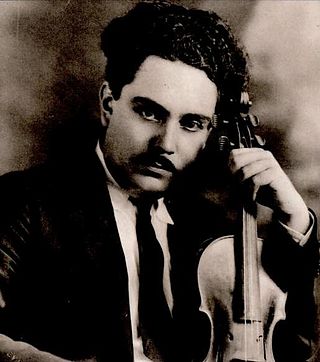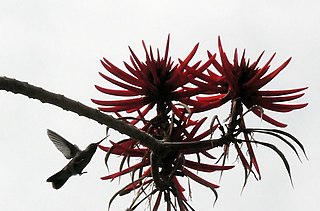Related Research Articles

Silvestre Revueltas Sánchez was a Mexican composer of classical music, a violinist and a conductor.

José Pablo Moncayo García was a Mexican pianist, percussionist, music teacher, composer and conductor. "As composer, José Pablo Moncayo represents one of the most important legacies of the Mexican nationalism in art music, after Silvestre Revueltas and Carlos Chávez." He produced some of the masterworks that best symbolize the essence of the national aspirations and contradictions of Mexico in the 20th century.

Gustavo Adolfo Dudamel Ramírez is a Venezuelan conductor and violinist. He is currently music director of the Simón Bolívar Symphony Orchestra and the Los Angeles Philharmonic. He is scheduled to become Music and Artistic Director of the New York Philharmonic in 2026.
Daniel Ayala Pérez was a Mexican violinist, conductor, and composer.

The Simón Bolívar Symphony Orchestra of Venezuela is a Venezuelan orchestra. Named after the Venezuelan national hero Simón Bolívar, it was initially the apex of the nation's system of youth orchestras. By 2011, it was no longer officially a youth orchestra as many of its members remained with the orchestra and the average age had risen to the early 20s. It was replaced as the national youth orchestra by the Teresa Carreño Youth Orchestra.

The National Symphony Orchestra is the most important symphony orchestra in Mexico. With its origins traced back as 1881, along with the Boston Symphony Orchestra, it is the second-oldest symphony orchestra in the American continent. The orchestra does not have a permanent venue but performs regularly in the Grand Hall of the Palace of Fine Arts in Mexico City.
Roberto Kolb Neuhaus is a Mexican musicologist and oboist of Austrian origin. He is widely known for his researches of Mexican composer Silvestre Revueltas. He has written many books and essays about the composer published in Mexico, United States, Vienna, and Berlin. He has been invited to musical congresses worldwide. In 1998 he published the first complete catalogue of Revueltas's works. He is the leading authority on Revueltas music.

Enrique Arturo Diemecke is a Mexican conductor, violinist and composer. He is currently the Artistic General Director of the Teatro Colón in Buenos Aires and music director of the Buenos Aires Philharmonic and the Flint Symphony Orchestra in Michigan, United States.
Enrico Chapela is a Mexican contemporary classical composer, whose works have been played by multiple major orchestras and has been commissioned to compose for institutions such as the Los Angeles Philharmonic, the National Center for the Performing Arts (Beijing) and the Festival Internacional Cervantino. His work is influenced by modern popular musical styles such as rock and electronic, as well as Mexican popular culture.

Sinfonía india is Carlos Chávez's Symphony No. 2, composed in 1935–36. In a single movement, its sections nevertheless follow the traditional pattern for a three-movement symphony. The title signifies the fact that the thematic material consists of three melodies originating from native-American tribes of northern Mexico. The symphony is Chávez's most popular composition.

Symphony No. 5, also called Sinfonía para cuerdas is a composition for string orchestra by Carlos Chávez, composed in 1953.

Janitzio is a symphonic poem by the Mexican composer Silvestre Revueltas, composed in 1933 and revised in 1936. A performance lasts about 15 minutes. The work is a portrait of Janitzio Island in Lake Pátzcuaro, Mexico.

Colorines is a symphonic poem for chamber orchestra by the Mexican composer Silvestre Revueltas, written in 1932.
Salvador Contreras Sánchez was a Mexican composer and violinist, a member of the Grupo de los cuatro.
La noche de los mayas is a film score by the Mexican composer Silvestre Revueltas for the 1939 film of the same name, Revueltas's score consists of 36 sequences without any organic relation to one another, composed to be easily fitted to an already-edited film.

Planos (Planes) is a chamber-music composition by the Mexican composer Silvestre Revueltas, also slightly enlarged and scored for full orchestra and published under its alternate title, Danza geométrica. Both versions were composed in 1934, and the scores are both dedicated to the architect Ricardo Ortega.

Cuauhnáhuac is an orchestral composition by the Mexican composer Silvestre Revueltas. It exists in three versions, the first for string orchestra, the other two for full orchestra with winds and percussion. The first version takes nearly 15 minutes to perform, while the third lasts only about 11 minutes.

Ventanas (Windows) is an orchestral work by the Mexican composer Silvestre Revueltas, written in 1931. A performance of it lasts about 11 minutes.

Esquinas (Corners) is an orchestral composition by the Mexican composer Silvestre Revueltas, written in 1931 and extensively revised in 1933. The first version is in two movements with a duration of about 11 minutes in performance; the second is variously described as being in one or in three (continuous) movements with a total duration of about seven minutes. The scores of both versions are dedicated to Ángela Acevedo.
References
- ↑ Talavera, Juan Carlos (24 March 2014). "Graban y publican la versión sinfónica de La noche de los mayas". excelsior.com (in Spanish). Retrieved 9 March 2019.
- ↑ Hall, Alexander (16 December 2018). "Women in the driving seat at the Elbphilharmonie". Bachtrack . Retrieved 12 April 2020.
- ↑ Kolb Neuhaus, Roberto. "La noche de los mayas: crónica de una performance de otredad exótica". Trans (Revista Transcultural de Música), no. 18 (October 2014) ISSN 1697-0101 (accessed 16 July 2017).
- ↑ Silvestre Revueltas: La noche de los Mayas: versión de Paul Hindemith; Juan Trigos: Concierto no. 2 (Hispano): para guitarra y orquesta, Raúl Zambrano (guitar), Tempus Fugit Orquesta, Christian Gohmer (cond.); recorded at Sony Music, Mexico City 10–12 June 2013. CD recording. Quindecim CDQP239. Mexico: Quindecim Recordings, 2014.
- ↑ Silvestre Revueltas, Musica para charlar; La noche de los Mayas. Orquesta Sinfónica de Guadalajara; José Yves Limantour (cond.). Musart MCD 3022 (LP). Mexico City: Discos Musart.
- ↑ Rite: Stravinsky/Revueltas . Simón Bolívar Youth Orchestra of Venezuela, Gustavo Dudamel (cond.) CD recording. Deutsche Grammophon 0289 477 8775 4.